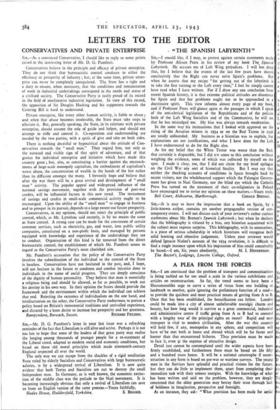CONSERVATIVES AND PRIVATE ENTERPRISE
LETTERS TO THE EDITOR
SIR,—As a convinced Conservative, I should like to reply to some points raised in the interesting letter of Mr. D. G. Pumfrett.
Conservatives believe in the principle and efficacy of private enterprise. They do not think that bureaucratic control conduces to either the efficiency or prosperity of industry ; but, at- the same time, private enter- prise can never be completely unregulated. The State has a right and a duty to ensure, when necessary, that the conditions and remuneration of work in industrial undertakings correspond to the needs and status of a civilised society. The Conservative Party is justly proud of its record in the field of ameliorative industrial legislation. In view of this record, the opposition of Sir Douglas Hacking and his supporters towards the Catering Bill is hard to understand.
Private enterprise, like every other human activity, is liable to abuse ; and when that abuse becomes intolerable, the State must take steps to alleviate it. But, generally speaking, the State, in its relations with private enterprise, should assume the role of guide and helper, and should not attempt to stifle and control it. Co-operation and understanding are needed by the two parties, with a spirit of give and take on both sides.
There is nothing deceitful or hypocritical about the attitude of Con- servatives towards the " small man." They regard him, not only as the outward and visible sign of that spirit of adventure, and of that genius for individual enterprise and initiative which have made this country great ; but, also, as constituting a barrier Against the encroach- ments of large-scale monopoly capitalism, the embodiment of capitalism's worst abuse, the concentration of wealth in the hands of the few rather than its diffusion amongst the many. I fervently hope and believe that after the war there will be a great revival and developinent of " small man " activity. The popular appeal and widespread influence of the national savings movement, together with the provision of post-war credits, will be influential factors in this new trend. The investment of savings and credits in small-scale commercial activity ought to be encouraged. Upon the ability of the " small man " to engage in business and to prosper in its pursuit, depends to a large extent our future prosperity.
Conservatives, in my opinion, should not reject the principle of public control, which, as Mr. Lyttelton said recently, is by no means the same as State control. A strong case can be made for the conversion of certain common services, such as electricity, gas, and water, into public utility companies, constituted on a non-profit basis, and managed by persons equipped with knowledge and experience of the undertakings they are to conduct. Organisation of this kind is far removed from the direct bureaucratic control, the establishment of which Mr. Pumfrett seems to regard as the Conservative Party's most cherished aim.
Mr. Pumfrett's accusation that the policy of the Conservative Party involves the subordination of the individual to the control of the State is baseless. Conservatives have not hesitated in the past, and, I hope, will not hesitate in the future to condemn and combat injustice done to individuals in the name of social progress. They are deeply conscious of the dignity of human personality. They believe that man is essentially a religious being and should be allowed, as far as possible, to work out his destiny in his own way. In their opinion the States should provide the framework and the environment within which the individual can achieve that end. Rejecting the extremes of individualism on the one hand, and totalitarianism on the other, the Conservative Party endeavours to pursue a policy based on Britain's immemorial traditions and unrivalled experience, and dictated by a keen desire to increase her prosperity and her greatness.


























 Previous page
Previous page